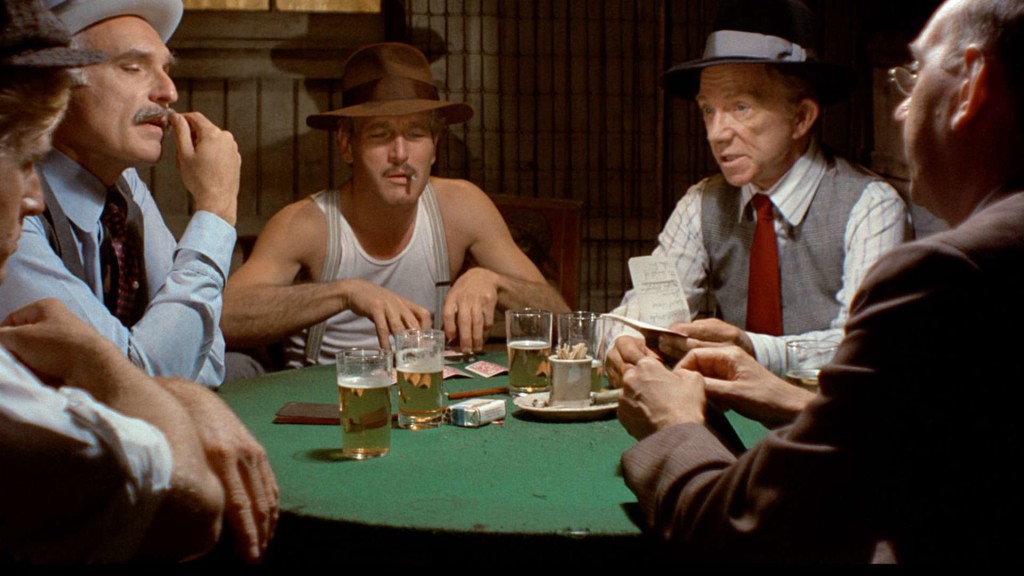Reviews include Civil War, In Flames, and The Greatest Hits.
Pros at Cons
February 27, 2015
by Adam Nayman
While walking the red carpet on Sunday night, Margot Robbie threw a little bit of shade at Ryan Seacrest, which instantly made her the hero of my Oscars viewing party (a title she held until Ida director Pawel Pawlikowski became the first Academy Award winner I’ve ever seen intentionally try to just outlast the orchestra’s attempts to play him off stage). But Robbie also looked a little rattled while she was trying to talk to Seacrest about her new film, Focus, a conspicuously expensive-looking drama co-starring Will Smith which – according to the actress – recently underwent a series of reshoots in Buenos Aires.
Such admissions of late-game creative tinkering might make prospective viewers nervous, especially since the promotional campaign for Focus – including the trailer that aired in prime-time during the Super Bowl in February – has been vague to the point of cryptic. In a post for Film School Rejects, Kate Erbland examines the strangely ambiguous aspects of the film’s promotion, as well as its supposedly troubled production history (including a round-robin of actors who signed on and dropped out of the project), wondering exactly how all of the advertised elements – con men, racecar driving, and gambling on the Super Bowl – could possibly fit together elegantly, or at all. “Have you ever seen the term ‘con’ used so often to tell us absolutely nothing?” she asks. “Perhaps Focus is the real con. It might not even be a real movie.”
Erbland is being glib, of course. But her piece gets at something true about the sprawling and largely subdivided “con man” genre: namely that for a movie’s marketers no less than its characters, there’s a lot riding on deciding exactly how close one should hold their cards to their chest. When it comes to movies predicated on big twists that flummox the people on screen, the audience should know as little as possible going in – or rather, they should know that they’re going to have the wool pulled cozily over their eyes and not a thing more.

The most beloved modern con man movie is probably The Sting, which won seven Academy Awards in 1974, including Best Picture, Best Director (for George Roy Hill) and Best Original Screenplay. It’s a marvelously constructed showcase for Paul Newman and Robert Redford, playing a pair of Depression-era grifters who escape certain ruin or bodily harm through a series of ingeniously constructed schemes, although what’s really protecting them is the oldest trick in the book: their movie-star charisma. The Sting is intricately written, but its turns, however clever, are ultimately perfunctory. We never doubt that the golden-boy protagonists are going to come out ahead: for all its ostensible surprises, the film’s appeal lies in its predictability.
Released to massive box office in the the same year that the Watergate scandal broke, The Sting put a charming face (actually two of ‘em) on the theme of corruption; its direct descendant in this regard is David O. Russell’s American Hustle, which, like The Sting, is a meticulously art-directed period piece celebrating benign, nobody-gets-hurt graft, except that its period is the early 1970s (one can imagine the characters played by Christian Bale and Amy Adams catching a matinee of The Sting in between scams).
For an example of a con man movie that actually dislocates its viewers – that makes the audience feel like they’ve well and truly been had – you’d have to look at David Mamet’s Reagan-era House of Games (1987), in which a tightly clenched psychiatrist (Lindsay Crouse) is first swindled and then seduced by a master manipulator (Joe Mantegna). Mantegna’s Mike is a man whose moral compass is so demagnetized by greed that he’s almost cheerfully sociopathic, but Mamet doesn’t let us off the hook by simply making him a villain. Rather, he suggests that Mike’s delight at bamboozling others is contagious, and the final scene, which occurs after the plot’s loose ends have all been tied up, serves a kind of anti-grace note – a suggestion that’s what at stake in this movie (and the American culture of the 1980s) has more to do with morality than money.
House of Games is the sort of movie for which the term “spoiler” alert was invented, but the film became a hit through word-of-mouth: it was independently produced and distributed, which meant that its producers never had to make the hard sell to a mass audience. This may be why the con man movies that tend to work are the ones that sneak into theatres from out of the shadows – like the fine 2001 Argentinian import Nine Queens, a movie very much in the terse Mamet mold – while higher-profile efforts are undermined by the built-in difficulties of promoting them. Long before Focus’ blurry trailer became the butt of jokes, Ridley Scott’s Matchstick Men (2003) flopped mainly because the most interesting thing about it – the slightly Paper Moon-ish relationship between Nicolas Cage’s awkward hustler and his estranged teenaged daughter (Alison Lohman) – had to be underplayed in ads in order to protect the integrity of its big twist (which I of course will not reveal here).
This is the frustrating industrial paradox of con man movies: they’re predicated on misdirection, but movie marketing can’t be elliptical or evasive (just ask the team that tried to sell the caper Mortdecai to the world without ever really clarifying who the guy in the posters is, or, more importantly, why anybody should care). But there’s another built-in problem in con man movies, which is that ever since The Sting – and in fact, long before that – audiences are primed to try to “solve” movies about hucksters and confidence men. On rare occasions, a con man movie is clever enough that even eagle-eyed viewers are left holding the bag – as in The Usual Suspects (1995), which plays fair with its protagonist’s fibbing by keeping the inspirations for his lies in plain view – but most of the time, their surprises feel as ritualized and regularly scheduled as the shoot-outs in action flicks. We will of course reserve judgment on how Focus fits into this lineage of films until we’ve seen it; the question at this point would seem to be whether or anybody else will be in the theatre when it opens.




